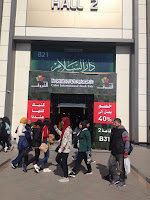When we arrive at the hotel, a security guard brings a rather fat, dopey looking labrador out to sniff the boot. At the door of the hotel, my baggage is put through an x-ray machine. The Egyptians are obviously very keen on security, but it makes me feel more unsafe than safe.
Inside my room, I run a bath ( a very exciting event for someone from Bulawayo) and make a cup of tea. The screen on the television says: Welcome, Bryony Rheam. Probably because I am tired, I find this a bit unsettling. It resonates too closely with Orwell's '1984'.
I am so tired, I struggle to sleep, especially as I know I have to be up early for the Book Fair. With my eyes propped open with matchsticks, I enjoy a wonderful breakfast of yogurt, figs, dates, pomegranates, walnuts and almonds. The fruit juice is lovely and fresh.
After realising I have missed the early bus to the Book Fair, I go back to my room and sleep for an hour. I feel so much better and more alive. A taxi arrives to fetch me and a couple of other authors. The man in the passenger seat is a Syrian playwright who I, unfortunately, do not get to speak to. The man in the back of the car with me is a scientist who specialises in mapping disease. He is from Kuwait and is very chatty. I ask him about the coronavirus. but he does not appear to be too interested in it and says he feels it will burn itself out as winter progresses in China. He is much more interested in the fact that I have had malaria and asks me what it was like.
T
he Book Fair is huge. I have never seen so many people buying books in my life. There is hall upon hall of booksellers and people walk around with an average of five bags each, containing the books they have bought.
As soon as I meet my Arab publishers, I am whisked away to a different hall where the discussion of This September Sun is to take place. I am surprised at how many people come to listen and enjoy being asked different questions about the book. I must admit, I do not particularly like the Arab version of the title which is September Letters. A number of people have asked me over the years where I got the title, This September Sun, without realising that the answer is actually in the book. The main character tries to write a poem about September, her favourite time of year, and finds she cannot get beyond the first line, This September sun . . . The idea is that some things cannot be expressed. September Letters, on the other hand, suggests that things can be expressed, that communication is effective.
The funny thing about being an author is that in many ways you are bottom of the food chain when it comes to your book. A good example of this is the choice of cover over which I have no control whatsoever.
At lunchtime, I try some of the bread, which is very much like a very light pita bread with a hummus filling. It is very filling! Throughout the afternoon, I meet other writers and people who have read my book and people who would like to read it. It seems funny signing what feels like the back page of the book, but I soon get used to it.
In the evening, I meet an American author who now lives in Auckland. Previously, she lived in Milan for ten years and learnt to speak Italian. When she wrote her first book, she felt something was wrong and the ideas just weren't working. A friend of hers claimed to have seen into the future and told her that she had seen her book in Italian. At first, she didn't think she could write a whole book in Italian, but then found the ideas were flowing much more smoothly and it worked.
We go out for dinner in what I think is central Cairo. It's Sunday night, but incredibly busy. It does not occur to me that Sunday is just a normal day in Egypt. It is a mad mixture of cars, kombis, tuk tuks, horses and carts, coaches and motorbikes. No one wears a helmet, there does not seem to be any limit as to how many people can get in a vehicle and there do not appear to be any rules of the road. If you want to go, you go.
We eat in the middle of the road. Literally. The tables are put out into the road and the traffic goes round them. The food is wonderful, although, because I don't eat meat, I don't try all of it. I love the aubergines and the cheese and olives. On an island in the middle of the road, wait all those hoping to get a table. This is not a place to linger over your food. As soon as a group gets up to leave, waiters descend and clear the dirty dishes, give the table a very light clean and put down paper menus which also act as mats.
On the way back to my hotel, we talk of belly dancers, traffic and happiness. Sherif tells me that he usually only begins to go out at eleven o'clock at night. My life feels very boring in comparison. Years ago, I worked as a cashier at Buffalo Bill's restaurant in Bulawayo. We closed at nine and often had complaints from people who arrived at ten to, only to be told that we were about to shut. I remember one man shouting, 'But anywhere else in the world, nine o'clock is early!' Well, yes. Except in Bulawayo.



No comments:
Post a Comment